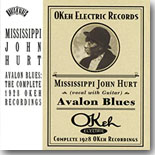|
Mississippi John
Hurt
Avalon Blues: The Complete 1928 Okeh Recordings
Columbia/Legacy |

A couple of months ago, I did
something that I’d wanted to do for about 30
years. I traveled to Avalon, Mississippi to
visit the home and resting place of
Mississippi John Hurt. I first heard the
great blues man on a collection of recordings
from the ’60s Newport Folk Festival in the late
’80s and I was taken by his warm, gentle
approach to the blues. It was quite a change
from the other Mississippi country blues artists
that I’d previously heard, and I was as taken
with his music as his audience at Newport had
been.
As I am inclined to do when I hear a recording
from someone that I’m not familiar with, I dug into whatever
information I could find about John Hurt. Being in the
pre-internet, “info at your fingertips” era, it was a bit
difficult, but I did find out that he was born and spent most of
his life in Avalon, other than a brief period when he worked for
the railroad. He had learned guitar at a young age, mostly
playing ragtime tunes, while working as a farm hand, but the
railroad experience helped to expand his repertoire and he soon
attracted the attention of Okeh Records, who enabled Hurt to
record 13 tracks in 1928.
Columbia/Legacy released Avalon Blues: The
Complete 1928 Okeh Recordings in the mid ’90s as part of
their Roots N’ Blues series. All of Hurt’s 13 tracks are
included here, and they include his first recorded versions of
“Frankie” (and Johnny), “Ain’t No Tellin’,” “Louis Collins,”
“Avalon Blues,” “Nobody’s Dirty Business,” “Candy Man Blues,”
and “Stack O’Lee,” songs that he would record again over 30
years later in the 1960’s. Hurt’s gentle, relaxed vocals are a
joy to hear, but his wonderful guitar playing often gets
overlooked.
What’s most amazing is that when was Hurt was
“rediscovered” 35 years later, he sounded just as good as he
does on these 1928 recordings, which still have absolutely
pristine sound compared to many pre-war recordings. The Okeh
sides didn’t sell very well at the time of their release, but
that didn’t seem to bother Hurt very much, as he returned to
Avalon where he did farm work and continued to play music for
his friends on the weekends. He probably would have been
satisfied to do that for the rest of his life if not for the
folk music revival of the late ’50s/early ’60s.
Upon his rediscovery, Hurt recorded several
albums of his old songs with a few new ones mixed in, he played
several festivals, and enjoyed a measure of popularity and some
financial success that he’d never imagined or expected. He
passed away in late 1966 at 73 years old.
Avalon Blues: The Complete 1928 Okeh
Recordings is a great place to start listening to
Mississippi John Hurt, but one album may not be enough for you
after hearing it. If you happen to be in the area, a visit to
Avalon is a must for blues fans. I posted about my recent visit
a few weeks ago at my
blog, so check it out.
--- Graham Clarke